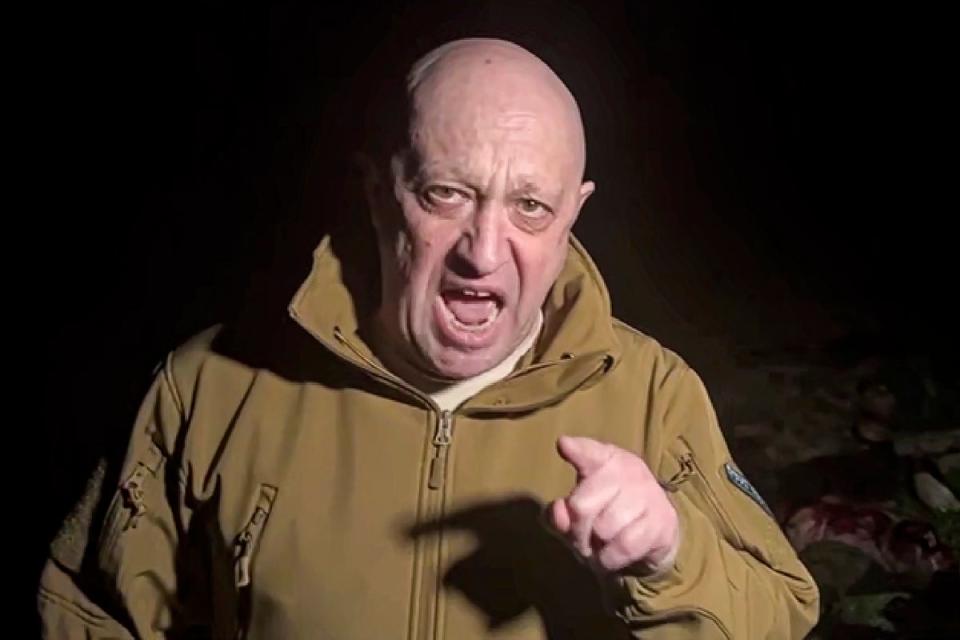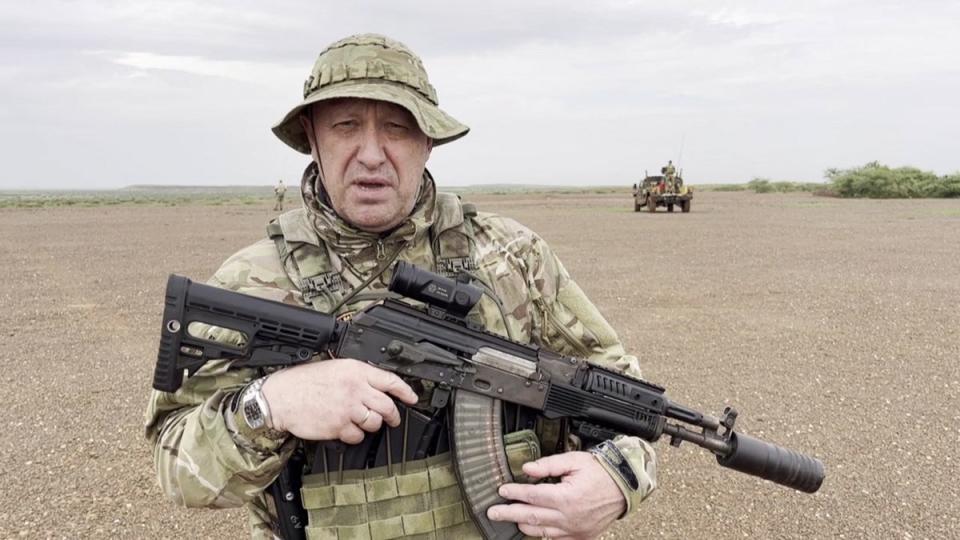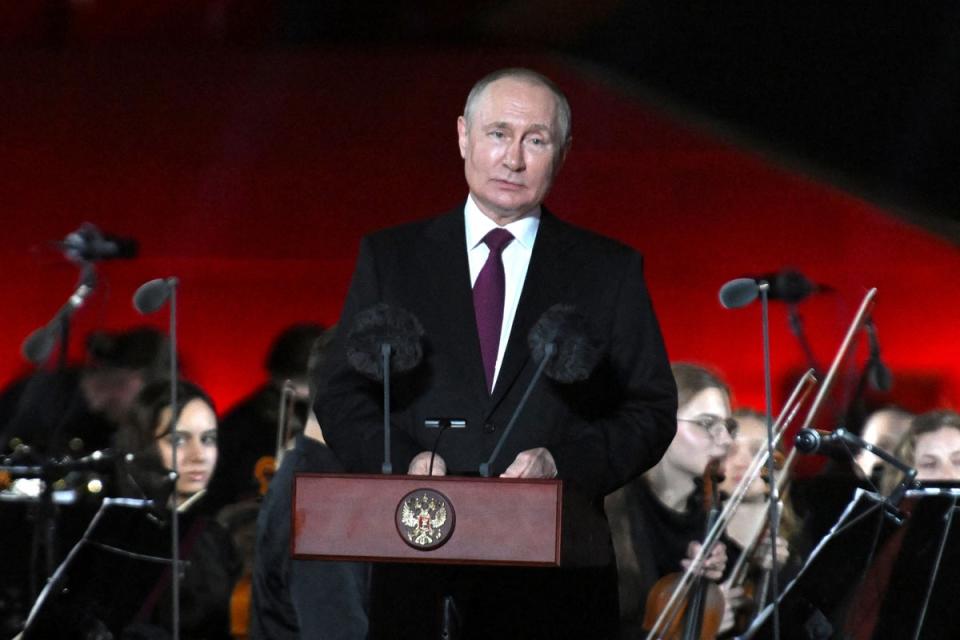Wagner mercenary chief Yevgeny Prigozhin ‘killed’ in plane crash with no survivors
Yevgeny Prigozhin, the Wagner mercenary group chief who led a failed munity against Moscow, is presumed dead after being named among passengers on a private jet that crashed into a field near Moscow with no survivors.
The 62-year-old warlord, who challenged Vladimir Putin’s authority in a 23 June uprising, was listed on the manifest, or passenger list, of an Embraer Legacy business jet that spiralled out of the sky in the Tver region, about 96km (60 miles) north of the capital, according to civil aviation authority Rosaviatsia. Dmitry Utkin, the co-founder of Wagner and a former Russian military intelligence special forces officer, was also on board, it said.
Flightradar24 online tracker showed that the Embraer Legacy 600 (plane number RA-02795) carrying Prigozhin had dropped off the radar at 1811 local time (1511 GMT).
Seven passengers and three crew were said to be aboard the aircraft, which was flying from Moscow to St Petersburg. The bodies of all 10 people travelling on board the crashed plane have been recovered from the site, and the search operation has been completed, says the Interfax news agency, quoting emergency services.

The cause of the crash was not immediately clear, but video circulated on the Baza Telegram channel, which is closely associated with Russian security services, showing a plane spiralling into a nosedive. Flight tracking data gave no indication of a distress call or inflight emergency, and the aircraft was still climbing when it disappeared from the radar. Media channels linked to Wagner quickly claimed a Russian air defence missile had shot down the plane, without citing evidence.
Prigozhin’s longstanding feud with Russia’s beleaguered military, and his aborted uprising, would give Mr Putin’s state apparatus plenty of motive for revenge. The mutiny, which ended when a deal was stuck between Prigozhin and the Kremlin, marked the most significant threat to Putin’s authority during his decades in power.
As news of the crash broke, the president was attending a concert commemorating the 1943 Battle of Kursk and hailing the troops of Russia’s 2022 invasion of Ukraine.
Mikhail Podolyak, a chief adviser to Ukraine’s president Volodymyr Zelensky, said Prigozhin’s reported demise showed “it is obvious that Putin does not forgive anyone for his own bestial terror”. Prigozhin’s deal to end the uprising was a “death warrant”, he added.
The UK Foreign Office said it was “monitoring” the situation closely, while US president Joe Biden said he was not surprised by the reports, adding that “not much happens” in Russia that Putin is not behind.
A Telegram channel linked to Wagner said Prigozhin is dead. The Grey Zone account said he was “killed as a result of actions by traitors of Russia”.
In an image posted by another pro-Wagner social media account showing burning wreckage, a partial tail number matching the jet could be seen. Prigozhin has reportedly used the plane before, including shortly after the aborted armed uprising.
A second private jet linked to Prigozhin, which also appeared to be heading to St Petersburg, turned back to Moscow and landed, flight tracking data showed.

Once a low-profile businessman, Prigozhin profited from Mr Putin’s patronage, earning the nickname “Putin’s chef”. He amassed a fortune from state contracts and later went on to establish a paramilitary army that became an important extension of Russian power abroad.
Moscow would repeatedly deny any official link to the Wagner group, founded in 2014. Fighters for the private military company were deployed in support of Moscow’s allies in countries including Syria, Libya and the Central African Republic. The United States has sanctioned it and accused it of atrocities, which Prigozhin had denied.
Prigozhin had acknowledged that he founded and financed the Internet Research Agency, a company Washington says is a “troll farm” which meddled in the 2016 US presidential election. In November 2022 he admitted that he had interfered in US elections and would do so again.
He soared in prominence after Russia's February 2022 invasion of Ukraine, where his fighters – including thousands of convicts he recruited from prison – were at the vanguard of the Russian assault on the eastern city of Bakhmut. That battle became the longest and bloodiest battle of the war, and gave Prigozhin a boost in power among Kremlin circles and among the Russian military elite. It would also have made him plenty of enemies. Prigozhin used social media to trumpet Wagner's successes and wage a months-long feud with the military establishment, accusing it of incompetence and openly questioning decisions made on the Ukrainian frontline.

In June, Prigozhin led the mutiny in which Wagner fighters took control of the southern city of Rostov-on-Don and shot down a number of military helicopters, killing their pilots, as they advanced towards Moscow. In a television address as Prigozhin’s forces marched twowrads Moscow, Mr Putin called it an act of treachery that would meet with a harsh response. The deal ended the march would be made hours later.
As part of that deal, Prigozhin and some of his fighters would leave for Belarus and a criminal case against him for armed mutiny would be dropped. But confusion has surrounded the implementation of the deal and the future of Prigozhin. The Kremlin said he attended a meeting with Mr Putin five days after the mutiny ended.
Then, on 5 July, Russian state TV said an investigation against him was still being pursued, and broadcast footage showing cash, passports, weapons and other items it said were seized during a raid on one of his properties. In late July, Prigozhin was photographed in St Petersburg during a Russia-Africa summit in the city. Prigozhin appears to have been able to move relatively freely, a surprise given the anger Mr Putin showed while the mutiny was taking place.
On Monday, Prigozhin appeared in a video where he hinted he was in Africa, where Wagner are seeking recruits.
Also this week, Russian media reported, citing anonymous sources, that General Sergei Surovikin was dismissed from his position of the commander of Russia’s air force. Mr Surovikin, who at one point led Russia’s operation in Ukraine, has not been seen in public since the mutiny, when he recorded a video address urging Prigozhin’s forces to pull back.


